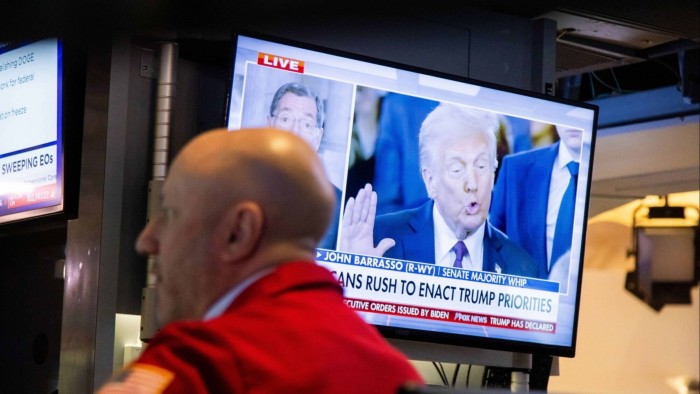Unlock the White House Watch newsletter for free
Your guide to what the 2024 US election means for Washington and the world
The fabled stock market vigilantes are going to have to work much harder than this to tame Donald Trump.
Since Trump’s re-election, a lot of investors and analysts have clung to the notion that it’s OK, the president won’t do anything too wild with economic policy because he uses stocks as real-time popularity gauges and will avoid doing anything to upset them. A short, sharp drop in stocks in response to any peculiar announcement would soon force a change of heart, or so the theory goes.
That may still be true at some point. But it’s not now. Instead, the immediate market reaction to Trump’s announcement over the weekend of imminent steep taxes on goods from neighbours and allies Canada and Mexico, and milder additional duties on goods from China, was rather tame.
The benchmark S&P 500 index opened 1.4 per cent lower — not great, but hardly a disaster. An immediate 5 per cent plunge in the index and maybe some circuit-breaker suspensions in the worst-affected big-name stocks might have been enough to alarm the president, but not this.
One possible reason for the relative calm is that a large slice of investors think starting a trade war with Nato allies is an actively good idea — for the US economy, for geopolitical stability, or both. Maybe money managers are cheered by the sight of USAID being put in peril or by Elon Musk’s Department of Government Efficiency gaining access to the plumbing of the Treasury department. Let’s say for now that is a theoretical possibility but not the most likely explanation.
Instead, the ho-hum reaction, which is mirrored also in the dollar (up a bit, nothing too bracing) and in Asian and European stocks (down a bit, not a bloodbath) reflects a few important assumptions.
One is that, to quote John McEnroe, he cannot be serious. The inevitable rise in costs for consumers of imported goods, potential resurgence in the very inflation Trump vowed to defeat, and damage to global relations all point to a change of heart at some point soon. The self-harm is just too great. As Jan Hatzius and others at Goldman Sachs put it, “while the outlook is unclear, we think the Canada- and Mexico-focused tariffs are likely to be short lived”.
This turned out to be rather prescient. Even before the new taxes kicked in, Trump and Mexico’s president said they were on hold for a month. But the evidence so far this year suggests it is flat-out dangerous to assume calm heads will prevail.
The other possibility is that investors are just really bad at reading Trump. He has been a fan of tariffs for decades. He used them liberally in his first term in office. He spoke about them constantly on the campaign trail. He spoke about them at his inauguration. But markets have failed to take him at his word.
Investors thought enlightened self-interest would give the president pause. Then they thought Treasury Secretary Scott Bessent would act as an adult in the room, sensitive to the cold hard realities of economics and able to steer the president away from his darker impulses. None of this has worked.
“Trump has made an end to the self-delusion in markets, the media and in politics that his tariff threats should be taken with a grain of salt,” wrote Philip Marey, a strategist at Rabobank.
So, now that markets are on a low-salt diet, it is worth taking Trump entirely literally and entirely seriously on a range of geopolitical issues. One is Europe. Stocks there have been on a great run of late, as the very early days of Trump 2.0 have not delivered tariffs on the bloc. But as Trump reminded us today, he is serious about the EU, which he accused on Monday of conducting “an atrocity” in its trade relations with the US. Buckle up.
Another is Panama and Greenland. I keep asking bankers and investors what would happen if Trump really did try to secure new territory there. They keep laughing me off, although one fund manager suggested buying German government bonds. This is getting less funny by the day.
Even in a best-case scenario where Trump extracts whatever concessions he wants to backtrack on some or all of the new tariffs, significant harm has already been done. “Even if shortlived, threatened tariffs have two consequences,” said Paul Donovan at UBS. “Distrust may make negotiating trade deals more difficult. If the news cycle makes US consumers fearful about real income growth or job security, they may be less inclined to spend.”
The economic pain, then, can still be real, even just from threats. But it is ambitious to assume stock vigilantes are going to stop it. Trump will chalk up this early reaction as a win and a validation by Wall Street of his efforts to make America great again.
Read the full article here




